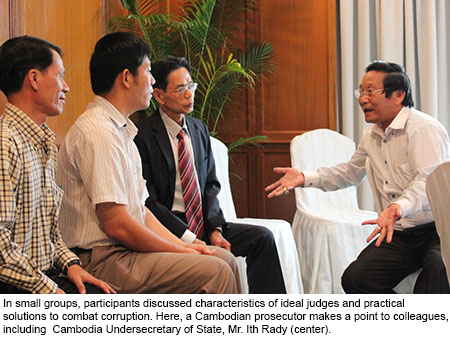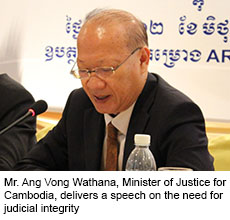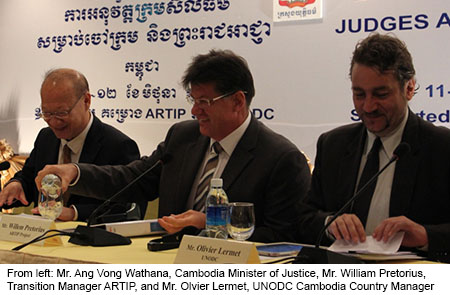|
|
|
|
|
|||||
|
||||||||
|
|
||||||||
|
|
||||||||

Phnom Penh (Cambodia), 6 July 2012 - In Cambodia and throughout the world, corruption exists in the judiciary: extortion, bribery, political influence, trading in influence, biased participations in trials and nepotism. Cambodian judges, prosecutors and senior Government ministers gathered recently at a judicial integrity workshop in Phnom Penh to discuss - candidly and often heatedly - breaches in ethical judicial practice in Cambodia and their consequences. They also debated the values and qualities that make for a fair and ethical judge, and how to ensure that judges can better uphold judicial integrity and its values in Cambodia's courtrooms.
 "The loss of honesty in the judicial and prosecutorial profession has created a lack of public confidence in the court system," Mr. Ang Vong Wathana, Minister of Justice for Cambodia, told attendees. Noting instances where villagers chose to flee rather than attend their trial, fearing the outcome of an unjust judicial court, the Minister discussed how judicial corruption prevents the court from fulfilling its function: to protect the rights of the people it serves.
"The loss of honesty in the judicial and prosecutorial profession has created a lack of public confidence in the court system," Mr. Ang Vong Wathana, Minister of Justice for Cambodia, told attendees. Noting instances where villagers chose to flee rather than attend their trial, fearing the outcome of an unjust judicial court, the Minister discussed how judicial corruption prevents the court from fulfilling its function: to protect the rights of the people it serves.
Organized by Cambodia's Ministry of Justice with support from UNODC and Asia Regional Trafficking in Persons (ARTIP), the workshop's aim was to ensure that participants understood the provisions of relevant international and national laws including Cambodia's judicial Code of Ethics.
Participants also discussed practical problems preventing the full realization of these laws and concrete solutions to uphold them. One of the workshop outcomes is a report that identifies current challenges of the court system and how to address them, and that will be used by the Royal government of Cambodia to fight against corruption.
"The honest and straightforward feedback you gave us will help the Ministry of Justice as we adopt and draft new laws regarding the judicial system," said H.E. Ith Rady, Undersecretary of State, and a national expert on judiciary affairs.
Cambodian and international experts detailed the international treaties relevant to judicial integrity to which Cambodia is party, and the relevant national legal framework.
In small group sessions, court officials discussed ideal ethical characteristics of judges, and created an assessment sheet evaluating how judges in Cambodia fulfilled these characteristics.
In a group discussion on the independence of judges in Cambodia, one participant noted: "Judges and prosecutors are not just concerned with facts and the law. Outside of the courtroom there is pressure. This pressure creates fear, and it is then difficult to make unbiased decisions."

"What's interesting about this workshop is the interactive aspect. Discussions were very candid. Participants' willingness to discuss problems and to propose solutions was noteworthy," said Mr. Shervin Majlessi, UNODC Regional Anti-Corruption Advisor, and one of the organizers for the workshop.
Participants agreed that more concrete laws be established to increase the support they receive from society and the government, decrease outside influences, and ultimately help them make more independent, impartial and just decisions.
Background:
The Judicial Integrity workshop was supported by the
UNODC "Global Programme against Corruption", which supports countries in their efforts to identify and fight corrupt practices. UNODC supported the establishment of the
Judicial Integrity Group to promote judicial integrity worldwide. By adopting the
'Bangalore Principles of Judicial Conduct,' the Judicial Integrity Group helps to develop ethical judicial standards and offers a framework for countries attempting to regulate judicial conduct.
The
ARTIP Project, which took the lead in working with the Government on developing the workshop's programme, is an initiative funded by AusAid, the Australian Agency for International Development that aims to prevent trafficking in persons in South-East Asia. It promotes effective responses to trafficking by supporting justice systems.
Reinforcing non-corrupt governance is one of the core areas of the Rectangular Strategy and the National Strategic Development Plan of Cambodia, but corruption still remains one of the country's main challenges.
UNCAC, which was ratified by Cambodia, provides an excellent framework for addressing these challenges, including judicial integrity.